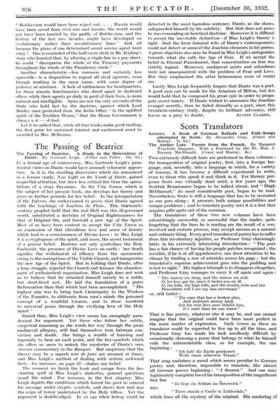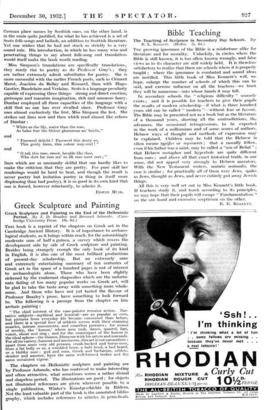Scots Translators
The Amber Lute. Poems from the French. By Margaret Winefride Simpson. With a Foreword by the Rt. Hon. J. Ramsay MacDonald. (Grant and Murray. 6s.) Two extremely difficult feats are performed in these volumes : the transposition of original poetry, first, into a foreign lan- guage, and, secondly, into a language in which, for a variety of reasons, it has become a difficult experiment to write, even to those who speak it and think in it. For literary pur- poses Scots was virtually dead until, a few years ago, the Scottish Renaissance began to be talked about, and " Hugh McDiarmid," its most considerable poet, began to be read. Nevertheless, Scots is still a language that has to be recreated as one goes along ; it presents both unique possibilities and unique problems ; and to translate poetry into it is a feat that requires gifts quite out of the common.
The translators of these two new volumes have been astonishingly successful, so successful that the reader, quite forgetting that the lines he is reading are the result of a very involved and esoteric process, may accept success as a natural and ordinary thing. Every good translator of poetry has to suffer from this involuntary injustice, as Professor Gray charmingly hints in his extremely interesting introduction : " The poet has a fair chance of having his purple patches recognized ; the novelist, if he is at all apprehensive, can draw attention to his climax by trailing a row of asterisks across his page ; but the translator's supreme achievement goes into the pudding and is lost to sight." His highest triumph is to disappear altogether, and Professor Gray manages to carry it off again and again :
" The waters rin deep, and the waters rill still. 0, let love gae by, since it bodes you sic ill. 0, the hills, the high hills, and the straths wide and fair Henceforth will I see my lass nevermair."
or, still better :
" The man that has a broken ploo, And stubborn steeny land,
Gin his true love ance lichtlie him, It's mair than he can stand."
That is fine poetry, whatever else it may be, and one cannot imagine that the original could have been more perfect in the Mere matter of expression. Such verses as these no translator could be expected to live up to all the time, and Professor Gray has made his task needlessly difficult by occasionally choosing a poem that belongs to what he himself calls the untranslatable class, as for example, the one
beginning :
" Ich hab' die Nacht getraumet Wohl einen schweren Traum."
That song enshrines a mood which seems peculiar to German poetry and, therefore, impossible to translate, like almost all German poems beginning : " I dreamt." And one may legitimately complain too of his transposition of the magnificent first line
" Es liegt eon Schloss im osterreich " into • " There stands a Castle in Liddesdale,"
which loses all the mystery of the original. His rendering of German place names by Scottish ones, on the other hand, is in the main quite justified, for what he has achieved is a set of Scots folk-songs and ballads, an addition to Scottish literature. Yet one wishes that he had not stuck so strictly to a very sound rule. His introduction, in which he has many wise and penetrating things to say about folk-song and translation, would itself make the book worth reading.
' Miss Simpson's translations are specifically translations they rarely rise to poetry as do Professor Gray's ; they are rather extremely adroit substitutes for poetry. She is more successful with the earlier French poets, such as Clement Marot, Joachim du Bellay and Ronsard, than with Hugo, Gautier, Baudelaire and Verlaine. Scots is a language peculiarly capable of expressing three things: strong and direct emotion, grotesque and macabre imagination, rich and sensuous fancy.
Dunbar employed all three capacities of the language with a skill that no one has ever rivalled since. Professor Gray uses almost exclusively the first, Miss Simpson the last. She strikes out lines now and then which read almost like echoes of Dunbar :
" White as the lily, rosier than the rose, As bales frae the Orient glamorous an' bricht,"
and
" Fareweel delicht ! Fareweel this dente ee, This genty form, this colour rosy-reid ! "
and
" 0 tak this rose, sweet, luvable like thee,
Wha dot for rose ser' to ilk rose most rare ; "
lines which are so uncannily skilful that one hardly likes to make the criticism that they are pretty. For pure skill her renderings would be hard to beat, and though the result is never poetry but imitation poetry (a thing in itself more displeasing than bad poetry), it is so good in its own kind that one is forced, however reluctantly, to admire it.
EDWIN 1111.-IR.































 Previous page
Previous page